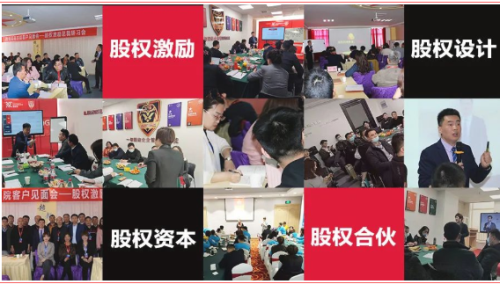從某種程度上講,股權(quán)激勵(lì)就像是企業(yè)對(duì)員工的一種長(zhǎng)期投資,同時(shí)也是一種長(zhǎng)期激勵(lì)。而只要是投資,在有收益的同時(shí),就一定會(huì)出現(xiàn)一定的風(fēng)險(xiǎn),收益與風(fēng)險(xiǎn)是并行的。
To some extent, equity incentives are like a long-term investment by a company in its employees, and also a long-term incentive. As long as it is an investment, there will inevitably be certain risks while there are returns, and returns and risks are parallel.
因此,企業(yè)在實(shí)施股權(quán)激勵(lì)前,一定要充分認(rèn)識(shí)到風(fēng)險(xiǎn)所在,才能做到規(guī)避風(fēng)險(xiǎn),獲得終的收益。這里小編將針對(duì)
山東股權(quán)激勵(lì)存在的三種風(fēng)險(xiǎn)做出全面分析,讓大家懂得風(fēng)險(xiǎn)之所在。
Therefore, before implementing equity incentives, enterprises must fully recognize the risks in order to avoid risks and achieve ultimate returns. Here, the editor will conduct a comprehensive analysis of the three risks of equity incentives in Shandong, so that everyone can understand the risks.
01
01
經(jīng)理人風(fēng)險(xiǎn)
Manager Risk
作為企業(yè)的職業(yè)經(jīng)理人,在股權(quán)激勵(lì)中,關(guān)心的是其擁有的股票賣出的價(jià)格,從而賺取更多行權(quán)與授予之間的差價(jià),并不是公司的長(zhǎng)期價(jià)值,以及公司未來更遠(yuǎn)的發(fā)展方向。
As a professional manager of a company, in equity incentives, what matters is the selling price of the stocks they own, in order to earn more difference between exercise and grant, rather than the long-term value of the company or its future development direction.
通常,在激勵(lì)方案中,經(jīng)理人的持股數(shù)量和時(shí)間往往是有限的,即使公司再慷慨,也不可能授予經(jīng)理人太多數(shù)量的股票,同時(shí)鎖定期也不可能過于長(zhǎng)久,尤其是上市公司。這些因素,都不同程度地影響到了股權(quán)激勵(lì)的效果。
Usually, in incentive plans, the number and duration of shares held by managers are often limited. Even if the company is generous, it is impossible to grant managers too many shares, and the lock-in period cannot be too long, especially for listed companies. These factors have varying degrees of impact on the effectiveness of equity incentives.
另外,經(jīng)理人的收入,往往與股票的價(jià)值變動(dòng)相關(guān)。這種變動(dòng),不僅僅與經(jīng)理人的努力有關(guān),同時(shí)還會(huì)受到政治制度、經(jīng)濟(jì)狀況和行業(yè)景氣度等因素的影響。
In addition, the income of managers is often related to changes in the value of stocks. This change is not only related to the efforts of managers, but also influenced by factors such as political system, economic conditions, and industry prosperity.
作為企業(yè),由于經(jīng)理人市場(chǎng)的不健全,導(dǎo)致在錄用經(jīng)理人時(shí),是無法直接利用市場(chǎng)手段對(duì)經(jīng)理人的經(jīng)營(yíng)能力進(jìn)行客觀的評(píng)價(jià),這也在無形中為企業(yè)選擇經(jīng)理人帶來了諸多隱患。
As an enterprise, due to the imperfect manager market, it is impossible to directly use market methods to objectively evaluate the management ability of managers when hiring them, which also brings many hidden dangers for enterprises to choose managers.
02
02
資本市場(chǎng)風(fēng)險(xiǎn)
Capital market risk
雖然上市公司與非上市公司在實(shí)施股權(quán)激勵(lì)時(shí)存在的風(fēng)險(xiǎn)隱患不同,但同樣存在巨大的資本市場(chǎng)風(fēng)險(xiǎn)。上市公司——主要是資本市場(chǎng)的系統(tǒng)性風(fēng)險(xiǎn)(如公司股價(jià)的漲跌波動(dòng))與非系統(tǒng)性風(fēng)險(xiǎn)(如政策因素);非上市公司——主要是資本市場(chǎng)對(duì)公司估值變化帶來的風(fēng)險(xiǎn)。
Although listed companies and non listed companies have different risks and hidden dangers when implementing equity incentives, there are also significant capital market risks. Listed companies - mainly the Systematic risk of the capital market (such as the fluctuation of the company's share price) and non Systematic risk (such as policy factors); Non listed companies - mainly the risks brought by changes in company valuation in the capital market.
上市公司的資本市場(chǎng)風(fēng)險(xiǎn)
Capital Market Risks of Listed Companies
在股權(quán)激勵(lì)實(shí)施的過程中,要求對(duì)整個(gè)公司的業(yè)績(jī)必須有一個(gè)客觀的評(píng)價(jià),這一任務(wù)通常由資本市場(chǎng)來完成。然而,目前資本市場(chǎng)還處于發(fā)展和摸索階段,并不成熟,尤其是對(duì)資本市場(chǎng)資金力量的操縱及政策上的過多干預(yù),使得社會(huì)審計(jì)體系無法保證在客觀、公正的情況下正常運(yùn)行,效率極低。一家上市公司很難通過股價(jià)來確定其長(zhǎng)期價(jià)值,這也在不同程度上注定了,股權(quán)激勵(lì)的受益人——經(jīng)理人往往要承受較大的潛在的市場(chǎng)風(fēng)險(xiǎn)。
In the process of implementing equity incentives, it is required to have an objective evaluation of the performance of the entire company, which is usually completed by the capital market. However, at present, the Chinese capital market is still in the stage of development and exploration, and is not mature. Especially, the manipulation of capital market funds and excessive policy intervention make it impossible for the social audit system to operate normally under objective and fair conditions, resulting in extremely low efficiency. It is difficult for a listed company to determine its long-term value through its stock price, which to varying degrees determines that the beneficiaries of equity incentives - managers - often have to bear significant potential market risks.
非上市公司的資本市場(chǎng)風(fēng)險(xiǎn)
Capital Market Risks of Non Listed Companies
非上市公司同樣存在著資本市場(chǎng)風(fēng)險(xiǎn)。比如一家民營(yíng)企業(yè),首次融資時(shí)公司的估值不大,但融資后公司通過努力在行業(yè)中占據(jù)了一定的地位,此時(shí)再融資必然會(huì)使得估值大幅提升。若這時(shí)公司進(jìn)行股權(quán)激勵(lì)的話,股票價(jià)格就會(huì)發(fā)生變化。尤其是互聯(lián)網(wǎng)公司,或許一年后公司會(huì)在競(jìng)爭(zhēng)中落后,甚至倒閉,這就導(dǎo)致股權(quán)激勵(lì)成為看得見、摸不著的“海市蜃樓”。
Non listed companies also face capital market risks. For example, for a private enterprise, the valuation of the company during the initial financing is not significant, but after the financing, the company has made efforts to occupy a certain position in the industry. At this time, refinancing will inevitably lead to a significant increase in valuation. If the company conducts equity incentives at this time, the stock price will change. Internet companies, in particular, may fall behind in the competition or even go bankrupt a year later, which will lead to equity incentive becoming a visible and intangible "Mirage".

03
03
法律風(fēng)險(xiǎn)
Legal risks
當(dāng)前,上市公司實(shí)施股權(quán)激勵(lì)計(jì)劃所遵循的現(xiàn)行法律法規(guī)和規(guī)章制度中,存在著不少相互矛盾或不一致的規(guī)定,具體體現(xiàn)在三個(gè)方面。
Currently, there are many contradictory or inconsistent provisions in the current laws, regulations, and rules followed by listed companies in implementing equity incentive plans, which are reflected in three aspects.
1、《公司法》與《上市公司股權(quán)激勵(lì)管理辦法》的相關(guān)規(guī)定不一致;
1. The relevant provisions of the Company Law and the Management Measures for Equity Incentives of Listed Companies are inconsistent;
2、《股票上市規(guī)則》與《公司法》對(duì)激勵(lì)股票禁售期的規(guī)定不一致;
2. The provisions of the Stock Listing Rules and the Company Law on the incentive stock lockdown period are inconsistent;
3、《公司法》與《企業(yè)會(huì)計(jì)準(zhǔn)則第11號(hào)——股份支付》等對(duì)關(guān)于股權(quán)激勵(lì)代價(jià)的會(huì)計(jì)處理規(guī)定不一致。
3. The accounting treatment provisions for equity incentive costs are inconsistent between the Company Law and Accounting Standards for Enterprises No. 11- Share-based Payments.
That's all for explaining the three types of risks related to equity incentives. We hope to provide you with good help. For more information, please visit our website http://www.yunjingwu.com.cn consulting service


